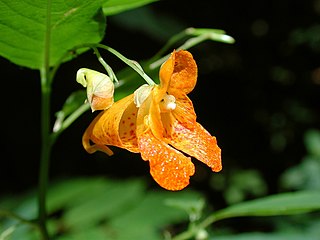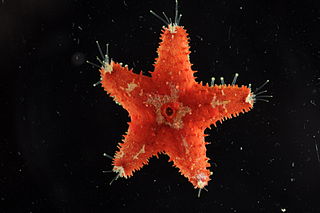
The honey badger, also known as the ratel, is a mammal widely distributed in Africa, Southwest Asia, and the Indian subcontinent. Because of its wide range and occurrence in a variety of habitats, it is listed as Least Concern on the IUCN Red List.

The rock hyrax, also called dassie, Cape hyrax, rock rabbit, and coney, is a medium-sized terrestrial mammal native to Africa and the Middle East. Commonly referred to in South Africa as the dassie, it is one of the five living species of the order Hyracoidea, and the only one in the genus Procavia. Rock hyraxes weigh 4–5 kg (8.8–11.0 lb) and have short ears.

The Cape hare, also called the brown hare and the desert hare, is a hare native to Africa and Arabia extending into India.

Olea capensis, the black ironwood, is an African tree species in the olive family Oleaceae. It is widespread in sub-Saharan Africa: from the east in Somalia, Ethiopia and Sudan, south to the tip of South Africa, and west to Cameroon, Sierra Leone and the islands of the Gulf of Guinea, as well as Madagascar and the Comoros. It occurs in bush, littoral scrub and evergreen forest.

Impatiens capensis, the orange jewelweed, common jewelweed, spotted jewelweed, jewelweed, spotted touch-me-not, or orange balsam, is an annual plant in the family Balsaminaceae that is native to North America. It is common in bottomland soils, ditches, and along creeks, often growing side by side with its less common relative, yellow jewelweed.

The spotted thick-knee, also known as the spotted dikkop or Cape thick-knee, is a wader in the family Burhinidae. It is native to tropical regions of central and southern Africa.

The yellowspotted catshark is a rare catshark of the family Scyliorhinidae. It is found in the southeast Atlantic, from Lüderitz, Namibia to central Natal, South Africa, between latitudes 0° and 37° S. It can grow up to a length of about 1.22 metres. The reproduction of this catshark is oviparous.

The Cape weaver is a species of bird in the weaver family, Ploceidae, found in southern Africa.

The African clawless otter, also known as the Cape clawless otter or groot otter, is the second-largest freshwater otter species. It inhabits permanent water bodies in savannah and lowland forest areas through most of sub-Saharan Africa. It is characterised by partly webbed and clawless feet, from which their name is derived. The word 'aonyx' means clawless, derived from the prefix a- ("without") and onyx ("claw/hoof").

The yellow bishop, also known as Cape bishop, Cape widow or yellow-rumped widow, is a resident breeding bird species in Angola, Botswana, Burundi, Cameroon, Congo, Equatorial Guinea, Eswatini, Ethiopia, Kenya, Lesotho, Malawi, Mozambique, Nigeria, Rwanda, South Africa, South Sudan, Tanzania, Uganda, Zambia and Zimbabwe.

Sebastes capensis, the false jacopever or Cape redfish, is a species of marine ray-finned fish belonging to the subfamily Sebastinae, the rockfishes, part of the family Scorpaenidae. It is found in the South Atlantic Ocean and may also occur off southern and western South America.

The Cape serotine is a species of vesper bat occurring in Sub-Saharan Africa. 'Serotine' is from Latin 'serotinus' meaning 'of the evening'.
The Diep River Fynbos Corridor is a nature reserve located in the Blaauwberg region of Cape Town, South Africa. It forms part of the larger Table Bay Nature Reserve, which was established in June 2012.

Pteraster tesselatus, the slime star or cushion star, is a species of starfish in the family Pterasteridae found in the North Pacific.

Pteraster militaris, the wrinkled star, is a species of starfish in the family Pterasteridae. It is found in the northern Pacific Ocean, the Arctic Ocean, the Barents Sea and the northern Atlantic Ocean.

Pteraster is a genus of sea stars in the family Pterasteridae.

The Tstsikamma Marine Protected Area is a marine protected area on the south coast of South Africa, in both the Western Cape and Eastern Cape. It is on the coast of the Tsitsikamma National Park, and is one of the oldest MPAs in the country. The MPA provides protection for marine habitat and wildlife, including birds and threatened and endangered fish species.

Euretaster insignis, commonly known as the striking sea star, is a species of starfish in the family Pterasteridae found in the central west Pacific Ocean. It is one of only three species in the order Velatida to be found in shallow water in the tropics. The young are brooded in a cavity underneath a "supradorsal" membrane.


















